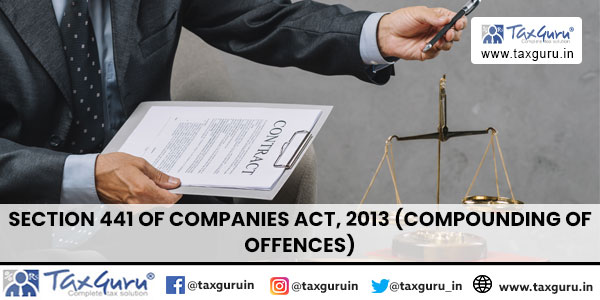Summary: Section 441 of the Companies Act, 2013, deals with the compounding of offences, which allows a company or its officers to avoid prosecution by paying a fine. Offences punishable with fines or fines coupled with imprisonment can be compounded by the National Company Law Tribunal (NCLT) or a Regional Director (RD) if the maximum fine does not exceed ₹25 lakhs. However, compounding is not possible if the same offence has been compounded in the last three years or if an investigation is pending. To initiate the compounding process, a company must convene a board meeting to determine the offence and calculate the fine. A board resolution is passed to file a compounding application, appoint representatives, and prepare necessary documents, including affidavits and a power of attorney. The application is submitted through E-form GNL-1, and a hearing follows. The competent authority, based on the offence, decides the fine, which must be paid within the prescribed period. If prosecution has already started, the compounding will be reported to the court, leading to the discharge of the accused from the prosecution. Non-compliance with the compounding order results in fines twice the amount specified in the relevant section.

Compounding of offences is a settlement mechanism that allows the offender to avoid lengthy litigation by paying money instead of facing prosecution. It’s a compromise between the offender and the competent authority. Compoundable offence is made good by paying the fee as decided by the NCLT/RD
⇒ Any offence punishable under the Companies Act,2013 committed by Company or any officer may be compounded by Ø
a) Tribunal or,
b) Regional Director; if maximum amount of fine for such offence does not exceed Rs.25 Lakhs.
⇒ Types of Offences that can be compounded
a) Offences that are punishable with “fine only”
b) Offences that are punishable with “fine or imprisonment”
⇒ Offence cannot be compounded in case a similar offence committed before and has been compounded and the period of three years has not expired.
⇒ Offence cannot be compounded in case either the investigation has been initiated or is pending.
⇒ Procedure for Compounding of Offence
1. Convene a Board Meeting
2. Determine the offence and calculate the fine to be paid by the company and/or officer in default as per the relevant section.
3. Board Resoltion is required to pass for the following purposes:
i. To file an Application of Compounding.
ii. Authorization for signing and submitting the application on behalf of the company.
iii. Appointment of Professionals to represent the company before the competent authority.
4. Prepare a Compounding Application in triplicate. Following must be attached with application:
i. Affidavit verifying the application.
ii. Memorandum of appearance or Power of Attorney
iii. Copy of notice from ROC, if any
iv. Other necessary documents
5. File E form GNL-1 with ROC attaching the application (Fees:1000).
Note: Single Form GNL-1 can be filed for the maximum 8 persons excluding the Company
6. Based on the amount of fine ROC forward the application to NCLT or Regional Director.
7. Personal Hearing will take place.
8. Competent Authority issue order deciding the fine to be paid.
9. Company and the Officer in default have to pay the fine within the time prescribed in order.
10. Intimation of order by the Company to ROC in Form INC-28 within 7 days of the receipt of the order.
⇒ Compounding Application can be filed either before or after the initiation of prosecution. Where the compounding of any offence is made after the institution of any prosecution, such compounding shall be brought by the Registrar in writing, to the notice of the court in which the prosecution is pending and on such notice of the compounding of the offence being given, the company or its officer in relation to whom the offence is so compounded shall be discharged from the prosecution.
⇒ If any Officer or other employee of the company fails to comply with any order, the maximum amount of fine proposed to be compounded under this section shall be twice the amount provided in the corresponding section in which punishment for such offence is provided.





